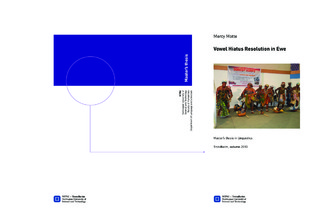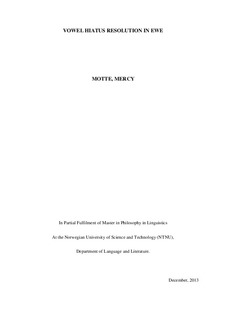| dc.contributor.advisor | Abrahamsen, Jardar Eggesbø | nb_NO |
| dc.contributor.author | Motte, Mercy | nb_NO |
| dc.date.accessioned | 2014-12-19T13:09:49Z | |
| dc.date.available | 2014-12-19T13:09:49Z | |
| dc.date.created | 2014-02-19 | nb_NO |
| dc.date.issued | 2013 | nb_NO |
| dc.identifier | 697755 | nb_NO |
| dc.identifier.uri | http://hdl.handle.net/11250/244291 | |
| dc.description.abstract | Vowel hiatus (two adjacent vowels or a sequence of two vowels in different syllables) is one phonological phenomenon that is seen in many languages including Ewe a Kwa language found in Ghana and a few other countries. Environments for vowel hiatus as discussed in this thesis are the juxtaposition of different lexical categories (noun, verb, adjective and possessive marker „ϕé‟) and compounds (noun+noun).
In a context as this, languages depend on several mechanisms to break the cluster which Ewe is no exception.
The methodology used included recordings of naturally occurring spoken data collected as native speakers went about their daily activities. Other few examples were taken from literatures, my knowledge of the language as a native speaker also gave lots of insights. Again, interviews on the subject were carried out. The study is built around two theories – Autosegmental theory and Optimality theory as these theories helped in the discussions found in the thesis.
The study resulted in the following discoveries:
Resolving vowel hiatus in Ewe is always by deleting one of the two adjacent or juxtaposed vowels.Deletion though the best in the resolution process results in resyllabification as syllables are affected.The deletion of the vowel does not always result in the loss of its tone too. Very often tones especially high tones are preserved which finally dock on new preferred neighbouring hosts. The tonal stability pattern seems to indicate that high tones are present underlyingly while low tones are quite often not.With the juxtaposition of different lexical categories as seen in the thesis such as verb+noun, adjective+noun and possessive particle ϕé+noun, in the case of elision, the target is very often other categories other than nouns. However, there were a few cases where prefixes of nouns dropped instead. Meaning that positional faithfulness in the category noun as argued cannot always be the case.When two juxtaposed vowels /e+a/ that is the final /e/ of a verb and the initial /a/ of a noun (in this order), the target in the event of deletion is always the final /e/ of the verb. | nb_NO |
| dc.language | eng | nb_NO |
| dc.publisher | Norges teknisk-naturvitenskapelige universitet, Det humanistiske fakultet, Institutt for språk og litteratur | nb_NO |
| dc.title | Vowel Hiatus Resolution in Ewe | nb_NO |
| dc.type | Master thesis | nb_NO |
| dc.source.pagenumber | 94 | nb_NO |
| dc.contributor.department | Norges teknisk-naturvitenskapelige universitet, Det humanistiske fakultet, Institutt for språk og litteratur | nb_NO |

